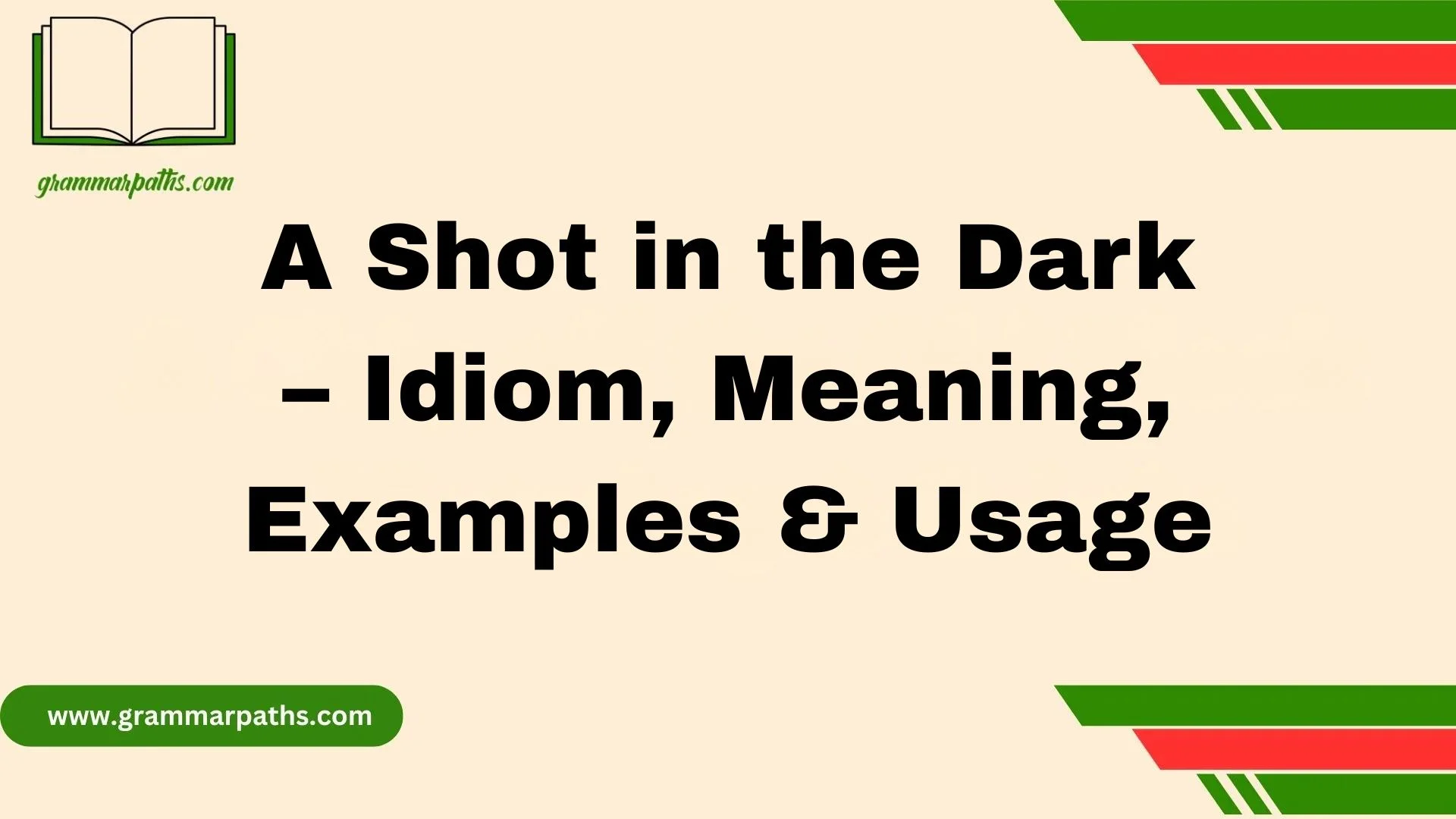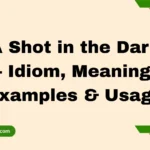The phrase a shot in the dark often slips into a sentence when language tries to capture how chance shapes our choices. I’ve felt this while making decisions at work, where the risk came from a lack of information. Sometimes it’s about leaping into the unknown, guided only by instinct rather than facts. That’s the expression’s real power—a saying that opens a gateway into the emotional tug-of-war between doubt and action. In real life, the odds can feel blurred, but a small spark of hope drives us forward, even when clarity gives way to uncertainty and no guarantees exist.
I’ve seen this play out in a meeting when someone took a chance, or in texting an old friend after years of silence, where the shot felt wild but the intent was genuine. That’s the nature of the dark—a place where certainty rarely lives, but the human drive to keep trying is stronger than hesitation. In those moments, the simple act of guessing carries meaning beyond the words themselves, showing how one shot—no matter how small—can change direction.
Meaning of “A Shot in the Dark”
At its core, the idiom means an attempt or guess made with very little information or guidance. It reflects uncertainty but not necessarily hopelessness. Sometimes the “shot” lands on target; other times, it misses completely.
Literal vs. Figurative Meaning
- Literal sense: Shooting a weapon into complete darkness, where you cannot see the target. The odds of hitting anything are slim.
- Figurative sense: Taking a guess or making a move without clear evidence, hoping it works.
Nuances of the Idiom
The phrase doesn’t always carry a negative tone. In fact, it can imply courage, creativity, or even luck. For example:
- “I didn’t know the answer, so I took a shot in the dark—and got it right.”
- “Starting that business was a shot in the dark, but it paid off.”
So while the idiom often suggests uncertainty, it can also reflect optimism and boldness.
Origins and Historical Background
Idioms often trace back to cultural practices, historical events, or metaphorical language. “A shot in the dark” has its roots in both literal imagery and metaphorical extension.
Early Uses
The phrase became popular in the 19th century, coinciding with widespread use of firearms in hunting and warfare. Shooting without light would have been an act of chance, perfectly capturing the meaning of uncertainty.
One of the earliest recorded literary uses appeared in the late 1800s. Newspapers of that era used the phrase to describe political predictions and scientific theories that lacked evidence.
Evolution of Meaning
Over time, the phrase shifted from literal hunting or shooting references to broader cultural use. By the mid-20th century, it was firmly established as an idiom meaning “random guess” or “risky attempt.”
Figurative Role of “Shot” in English
The word “shot” appears in many English idioms because it symbolizes risk, effort, or opportunity.
Common Idioms with “Shot”
| Idiom | Meaning | Example |
| Take a shot at | Try something | “I’ll take a shot at fixing the printer.” |
| Long shot | Attempt with slim chance | “Winning the lottery is a long shot.” |
| Big shot | Important person | “He’s a big shot in the tech industry.” |
| Cheap shot | Unfair criticism | “That comment was a cheap shot.” |
| Hot shot | Skilled or confident person | “She’s a hot shot lawyer.” |
These examples show that “shot” often implies a mix of risk, chance, and potential payoff. “A shot in the dark” fits neatly into this pattern.
Everyday Usage of the Idiom
You don’t need to be a linguist to recognize that this idiom pops up in casual conversations all the time.
Situations in Daily Life
- Answering questions without knowing the answer:
“I didn’t study, so my test answers were just a shot in the dark.” - Guessing about outcomes:
“It’s a shot in the dark, but maybe she’ll agree to help.” - Trying untested solutions:
“Rebooting the computer was a shot in the dark, but it worked.”
How Tone Changes Meaning
The phrase can sound serious, humorous, or hopeful depending on how it’s used. For instance:
- Serious: “Launching that product was a shot in the dark.”
- Humorous: “Guessing her favorite pizza topping is a shot in the dark.”
- Hopeful: “It’s a shot in the dark, but let’s apply for the grant anyway.”
Professional and Academic Contexts
While it’s casual in nature, the idiom finds its way into more serious settings too.
In Business
Managers often use it when describing uncertain strategies or trial ideas:
- “This marketing campaign is a shot in the dark, but it could attract new customers.”
In Science and Research
Researchers might call an early hypothesis a shot in the dark when it lacks supporting evidence:
- “The theory was a shot in the dark, but it sparked new experiments.”
When to Use and When Not To
- Appropriate: Brainstorming sessions, casual reports, or informal meetings.
- Inappropriate: Formal presentations or academic papers where precise language is required.
Cultural Presence in Literature, Music, and Media
This idiom has left a clear mark on books, movies, and music.
Classic Literature
Writers from the late 19th and early 20th centuries used it to describe uncertain ventures. For example, detective novels often employed the phrase to show risky guesses during investigations.
Modern Media
The idiom shows up in movies, TV shows, and pop culture. A notable example is the 1961 film A Shot in the Dark, part of the famous Pink Panther comedy series. It cemented the phrase in global pop culture.
Music
The phrase appears in several song titles and lyrics, often symbolizing love, chance, or risk. One well-known example is Ozzy Osbourne’s song “Shot in the Dark” from the 1980s, which used the phrase metaphorically to describe emotional vulnerability.
Global and Cross-Linguistic Perspectives
Many languages have their own way of expressing the same idea of a risky guess.
| Language | Equivalent Expression | Literal Translation |
| Spanish | Un tiro al aire | A shot in the air |
| French | Un coup dans l’eau | A blow in the water |
| German | Ein Schuss ins Blaue | A shot into the blue |
| Italian | Un colpo al buio | A blow in the dark |
These phrases show that the concept of taking uncertain chances is universal, even if the imagery differs slightly.
Variants and Related Idioms
“A shot in the dark” isn’t the only way to express uncertainty. Several similar idioms capture the same idea with subtle differences.
Related Phrases
- A stab in the dark – Almost identical, often interchangeable.
- A wild guess – Implies randomness, without the risk-taking imagery.
- A long shot – Suggests low probability but with possible high reward.
- Off the cuff – Unprepared response, less about risk and more about spontaneity.
Practical Examples and Case Studies
To see how this idiom functions beyond theory, let’s look at real-world scenarios.
Case Study: Workplace Brainstorming
During a product design meeting, an employee suggested a bold idea without much data to back it. The manager described it as “a shot in the dark.” Later, testing showed the idea solved a persistent problem. What seemed uncertain at first became a breakthrough solution.
Case Study: Everyday Conversation
A student guessed an answer on a history test, calling it “a shot in the dark.” Surprisingly, the guess turned out correct. The idiom here reflects both humility and luck.
Conclusion
Taking a shot in the dark is more than just a casual saying—it’s a reflection of how language captures risk, uncertainty, and the human spirit. Whether in real life decisions, a late-night meeting, or even texting someone after years, the phrase reminds us that even without full information or certainty, our choices and intent still carry weight. Sometimes the odds are blurred, the facts are missing, and the dark feels overwhelming, but the spark of hope makes the leap worthwhile.
FAQs
Q1: What does the idiom “a shot in the dark” mean?
It means making a guess or taking action with little or no information, often when the odds are uncertain.
Q2: Can “a shot in the dark” be used in formal writing?
Yes, but it works best in conversational language or storytelling sentences where risk and choices are highlighted.
Q3: Is “a shot in the dark” always about failure?
No. While it suggests risk, it also carries the power of hope and possibility, even without guarantees.
Q4: How is this idiom used in real life?
People use it when guessing answers, making decisions at work, or taking bold steps in personal situations—like texting someone after years.
Q5: Why is this idiom powerful?
Because it reflects the emotional tug-of-war between doubt and courage, showing how even a wild attempt can create meaningful outcomes.

Grace Marie is the dedicated writer behind GrammarPaths.com, where she shares her passion for English grammar, idioms, and writing mastery. With a strong background in language studies and years of experience helping learners improve their communication skills, Grace creates clear, practical, and engaging content that makes English easy to understand.












